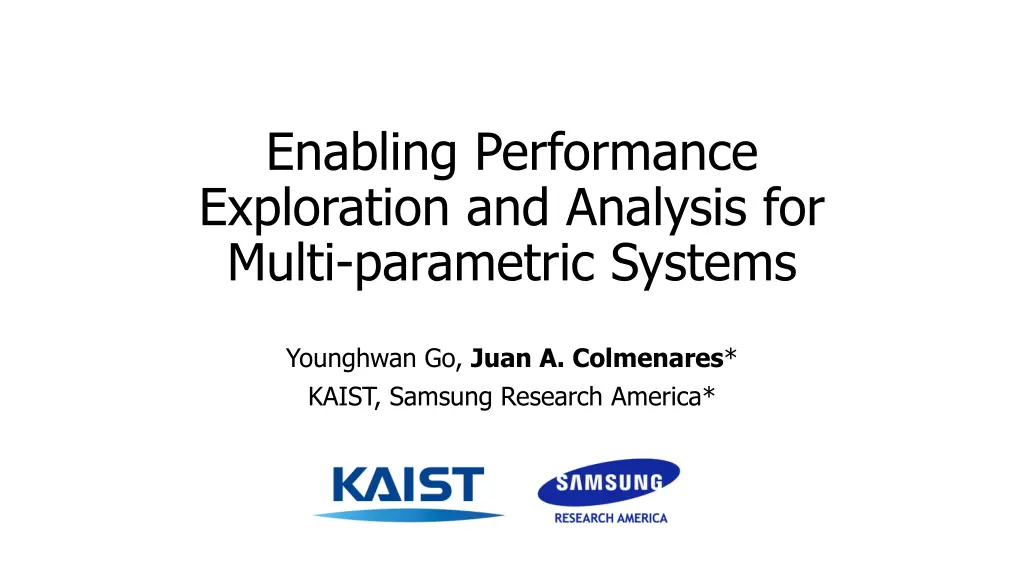
Performance Exploration and Analysis Framework for Multi-parametric Systems
Learn about the innovative SPEX framework designed for enabling performance exploration and analysis in multi-parametric systems. Overcome the challenges of system performance tuning by leveraging this user-friendly and flexible tool that allows for easy profiling and exploration of various platforms.
Download Presentation

Please find below an Image/Link to download the presentation.
The content on the website is provided AS IS for your information and personal use only. It may not be sold, licensed, or shared on other websites without obtaining consent from the author. If you encounter any issues during the download, it is possible that the publisher has removed the file from their server.
You are allowed to download the files provided on this website for personal or commercial use, subject to the condition that they are used lawfully. All files are the property of their respective owners.
The content on the website is provided AS IS for your information and personal use only. It may not be sold, licensed, or shared on other websites without obtaining consent from the author.
E N D
Presentation Transcript
Enabling Performance Exploration and Analysis for Multi-parametric Systems Younghwan Go, Juan A. Colmenares* KAIST, Samsung Research America*
Difficulty in System Performance Tuning Tuning 3rdparty systems is challenging How can I reproduce advertised performance? Performance Actual Advertised System resources No deep knowledge of system internals Need black-box trial-and-error tuning Multiple embedded platforms Need to tune separately for each platform 2
SPEX: System Performance Explorer Framework for characterizing performance of unfamiliar systems Easy to use, flexible, and applicable to various platforms Ease of profiling enabled by developers Developer instruments system code for profiling User enables relevant instrumentation without code Low profiling overhead Collect traces of only enabled probes Compact binary trace records of monitored system Flexible performance exploration Separate performance collection from policy Automatically explore large configuration space Observed System { } { } System Code Configuration ?????0 ?????1 Collector ?0 Agent ?1 Tracer Explorer Policy SPEX 3
Performance Data Collection Collector: gather trace records from probe circular queues Lock-free queues to prevent blocking Observed System Probe Trace Collector Free Trace Data Collector Control Tracer: process (calculate) trace records Control which probe to enable profiling Receive raw trace records (init_val, final_val) Calculate performance metric (e.g., throughput) Tracer SPEX Framework 4
Performance Exploration Explorer guides performance exploration with vary configurations Receive performance metrics from Tracer Teardown-configure-run process based on policy Exploration policy Interchangeable module to direct exploration Configure parameters observed system runs on Determine when to stop current run / exploration Configuration agent XML configuration file that contains parameters E.g., number of threads, file paths, names of remote nodes, other inputs Observed System { } { } System Code Configuration ?????0 ?????1 Collector ?0 Agent ?1 Tracer Explorer Policy SPEX 5
Evaluations (a) LLC refs and misses (b) Memory page faults Experiment setup Intel Xeon 3.2 GHz (hexa-core), 8 GB RAM, Ubuntu 14.04.4 LTS (kernel 3.13.0-79), 500 GB HDD Probe overhead and scalability Few hundred CPU cycles maintained throughout different number of threads Exploring query throughput of SQLite3 Setup: NYC Taxi Trips dataset (169M records)* Configuration: page size, cache size, thread number Policy: brute-force on all configurations Results Max performance at 3 threads = scalability collapse! Stable performance with vary page/cache size 6 *http://www.andresmh.com/nyctaxitrips/
Conclusions Difficult to trouble-shoot unfamiliar 3rdparty systems Limited understanding of system internals Redundant profiling between multiple platforms SPEX: a framework for system performance exploration Easy to use without the knowledge of system source code Low profiling cost with design optimizations Pluggable policy depending on interested performance metric Successful in finding max performance of practical systems (e.g., SQLite3) Correctly identify scalability collapse phenomenon Identify core parameter that affects performance Future Plan: Design and implement sophisticated exploration policy, support binary instrumentation, explore multi-node system 7
Thank you. Q & A 8
